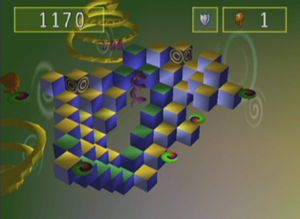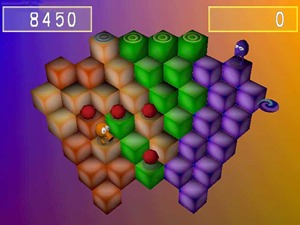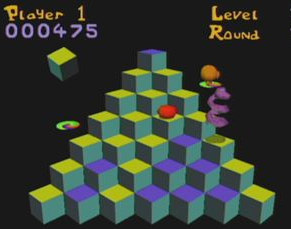@#$%*!!!
Twenty years ago, gamers were captivated by a foul-mouthed orange mutant named
Q*bert. In the two decades following his epic battle with the relentless Coiley,
Q*bert’s life evolved into a happy, normal existence. Q*bert had a girl, Q*dina
(you can tell she’s a girl because she’s got a bow), a powerless, frustrated
enemy named Q*dirk, and a big cube land to hop around in and show off the enigmatic
protrusion that must be the source of his power and charm (yeah, just go on thinking
it’s a nose).
Recently, with the help of Hasbro Interactive, an insidious corporation called
Sega stole Q*bert’s female and placed arch-nemesis Coiley in his path, hoping
the ensuing confrontation would be enough to revive their doomed platform.
When asked to comment on the situation, Q*bert said, “&%$#@.”
I’m inclined to agree with him. Instead of pulling legends like Q*bert
out of its slumber and pushing its heinous demise on the gaming public, I wish
Hasbro would just die. But like a fish out of water, they insist on producing
flop after flop after flop. Will Q*bert be any different? Just barely.
Keeping with the Q*bert you played eons ago, in this updated version
you play an odd orange fellow who has to jump around on an assortment of 3D
blocks. As you land on a block, you change it to a different color. The idea
is to change all the blocks on the screen to one identical color.
To make your job tougher, random balls fall throughout the cube matrix and
various enemies will try to touch you to death. The main enemy is Coiley, who
in the original version was as wicked as Satan incarnate. For the new version
Coiley has been slowed down, and Q*bert has been sped up – way up.
Q*bert’s quickness is the main improvement over the classic. Whereas the old
Q*bert hopped along at a pretty slow pace, the new Q*bert can really cut some
mean jukes, making the potential difficulty higher and the satisfaction of surviving
greater.
While the gameplay is more responsive, it’s still as simple as the original.
You only need to use the directional pad to hop around. This is cool because
you can actually eat or drink while playing the game, which actually works out
pretty well, since it only takes a hamburger and a Coke for Q*bert‘s
shine to wear thin.
Q*Bert can get little power-ups like speed up or invulnerability, which requires
the player to press the A button if they want to use them. But since they’re
largely pointless, I’d rather eat a burger or sip a Miller than horse around
with Q*Bert’s banal power-ups.
The levels are divided amongst four of Q*bert’s friends, each of whom has
about 25 levels for Q*bert to hop around in, making for close to 100 levels
total! Wow. In my opinion a game needs some serious growth potential to be worth
a hundred levels. Unfortunately, Q*bert‘s minimalist style grows bland
after about 20.
 Other
Other
than the main game, Q*bert offers a Classic mode and a Head to Head mode.
The classic mode is interesting for about 10 wistful minutes, then it just gets
plain hard and repetitive.
In Head to Head, Q*bert and Q*dirk have a given number of blocks they have
to convert. Once all of one side’s blocks are converted, a little fancy-looking
shiny thing can be grabbed, ending the level. There aren’t any good snares and
no time for much strategy, as the person who gets the most blocks in the least
time is invariably the winner. It’s fun for a little while, but lacks strategy
and the ability to really jack your opponent.
The hardest thing about Q*bert, and perhaps its greatest flaw, is the fact
that the isometric view in some levels obscures your view of the blocks. This
oversight is potentially irritating in all sorts of different ways, although
it mainly leads to the player jumping off the blocks and into wherever it is
Q*bert goes when he dies.
Q*bert‘s graphics aren’t astonishing, but they really don’t need to
be. Q*bert looks fine, if a little plain, and his levels are bright and colorful,
with all sorts of weird geometric shapes dancing in the background.
The sound effects are appropriate and mainly involve different variations on “boing,” while the background music is perfect for mindless, block-hopping fun.
Q*bert was a good game twenty years ago, and in some ways this version
is even better. However, Q*bert‘s lack of complex play mechanics, lack
of story, and lack of development make it pale in comparison to the contemporary
games that are coming out now. A fun hour or two and worth renting if you’ve
got the flow and a lot of food, but otherwise it’s just another rehashed old
game.

-
<b>Q*bert
-
For an hour
-
Gets really repetitive
-
Just another rehash
-
<b>Not











